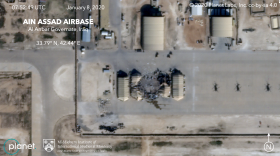-
The U.S. launched airstrikes in Syria on Thursday targeting Iranian-backed militia groups in the first known offensive military operation carried out by the Biden administration.
-
Secretary of State Antony Blinken has been in office three weeks. He arrives at a challenging time: the U.S. must figure out how to deal with China, Russia and Iran, the coronavirus pandemic rages on, and the State Department must rise from the morale slump it suffered during the Trump administration.
-
With a voice by turns soaring and haunting, Shajarian was considered one of his nation's treasures — and then ran afoul of the regime. He died Thursday in Tehran at age 80.
-
Sen. Tim Kaine, D-Va., led the effort to pass a bipartisan war powers resolution to end the president's ability to launch further strikes against Iran. The Trump administration has vowed to veto it.
-
In updating its tally, defense officials noted that most of the injured service members have been treated and returned to Iraq. The statement, once more, contradicts President Trump's initial remarks.
-
More than half the American troops diagnosed with concussions were transferred from the Iraqi base that was attacked to Germany or the U.S.
-
Iranian media quoted the military as saying human error led to the attack. The foreign minister blamed "US adventurism." Missiles struck the plane just after it took off from Tehran.
-
The vote, less than a week after the president approved a drone hit on an Iranian general, was mostly along party lines. In the Senate, Democrats are hoping to win GOP support for a similar measure.
-
Canada's prime minister announced the preliminary finding a day after the Ukrainian plane crash that killed 176 people, including 63 Canadians. Iran denied the assertion, saying it is "impossible."
-
At least five structures were damaged in the attack on the base in Anbar province, which apparently was precise enough to hit individual buildings. There have been no reports of casualties.
Play Live Radio
Next Up:
0:00
0:00
Available On Air Stations










